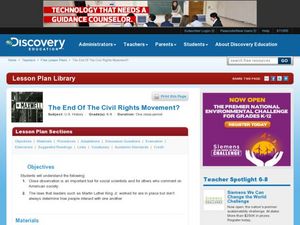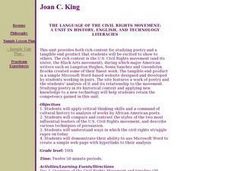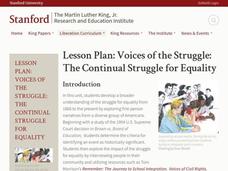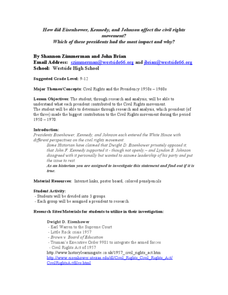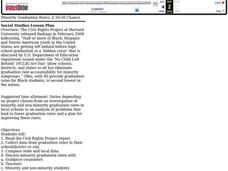Curated OER
Rosa Parks Changed the Rules
Students complete a diagram of the Montgomery bus that carried Rosa Parks into the history books. They read about Rosa Park's contributions to the Civil Rights movement. They role play Rosa Park's refusal to move to the back of the bus.
Curated OER
Should Homosexuals Have the Right to Laws Protecting Them From Discrimination?
Students explore discrimination issues in America. In this homosexual rights lesson, students listen to their instructor lecture on antidiscrimination laws and gay rights. Students respond to questions about the Romer v. Evans case.
Curated OER
Separate is Not Equal: Brown vs. Board of Education
Brown vs. Board of Education was a landmark case, but what other cases were influenced by its decision? By researching 1 of 14 civil rights legislative events, scholars follow this court case through recent events. Keeping in mind 6...
Curated OER
Civil Liberties and National Security
Students identify the civil liberties outlined in the U.S. Bill of Rights and discuss the importance of these liberties in today's society. They research examples of when Congress has taken legislative action to protect national security.
Curated OER
Civil Rights: An Investigation
High schoolers take a closer look at the political side of the American Civil Rights Movement. For this 20th century American history lesson, students research the contributions of President Johnson, Dr. Martin Luther King, Jr., and J....
Curated OER
The End of the Civil Rights Movement
Middle schoolers examine the relationships between blacks and whites in their community. In this racial discrimination lesson, students make race relations observations within their community and then write letters that reveal their...
Curated OER
The Language of the Civil Rights Movement
Tenth graders develop a website documenting poetry integral during the civil rights movement in the United States. Working in pairs, 10th graders research the people and poetry of that was prevalent during the civil rights movement. ...
Stanford University
Observing Human Rights Day
How much intervention is appropriate for America to take in cases of human rights violations? Class members ponder a question that has lingered since the birth of America with a series of primary sources that reflect the degree to which...
Cheryl L. Mason and William G. Thomas
Comparative Effects of Financing the Civil War
How do countries fund wars? Learners examine the economics of warfare through a comprehensive study of what measures were taken to fund wartime activities during the American Civil War. They'll start by reading a newspaper article from...
Stanford University
Voices of the Struggle: The Continual Struggle for Equality
As part of a study of the Civil Rights Movement from 1868 to the present, class members examine first person narratives, the Supreme Court case Brown v. Board of Education, and other significant events in civil rights history. They then...
Stanford University
Lesson Plan: The Children's Crusade and the Role of Youth in the African American Freedom Struggle
Young people played significant roles in the Civil Rights movement. Class members examine the contributions of Barbara Johns, Claudette Colvin, Mary Louise Smith, and the children of Birmingham,...
Stanford University
Martin Luther King, Jr. and Malcolm X: A Common Solution?
Much has been made of the differences between Martin Luther King, Jr. and Malcolm X. But was there any common ground between them? Class members reconsider what they think they know about these two civil rights leaders with biographical...
Defining US
Integration of Education and American Society
How did the struggle for Civil Rights during the 1950s transform American society and politics? Why are American schools integrated today? Class members explore these essential questions by examining a series of primary and secondary...
Described and Captioned Media Program
Malcolm X: Make It Plain, Part I
Malcolm X was a complicated man that few in white America understood. After sharing what they know or think they know about this civil rights leader, about nationalism and Black Nationalism, class members view a two-part documentary...
Curated OER
Human Rights
Students read the Universal Declaration of Human Rights and then research countries which have had human right violations.
Curated OER
Civil Rights Memorial
Students discuss the Civil Rights Movement and the key events that ended segregation in the United States.
Curated OER
How did Eisenhower, Kennedy, and Johnson affect the Civil Rights Movement?
High schoolers research Eisenhower, Kennedy, and Johnson then utilize their findings to determine what each of the three Presidents contributed to the Civil Rights Movement. For this U.S. History lesson, students work in small groups to...
Curated OER
Cultural Impact of Jim Crow Laws and Civil Rights Movement
Students compare the cultural customs of people from European descent and African Americans between 1900 and 1940. Next students listen to interviews about life during the time of Jim Crow laws, and determine how life might be different...
Curated OER
Cultural Impact of Jim Crow Laws and the Civil Rights Movement
Students examine the Jim Crow laws and how they impacted the lives of both African Americans and white Americans. They discuss the Civil Rights Movement and how their lives may have been different had it not occurred.
Groups...
Curated OER
Lincoln, Emancipation, and the Constitution
Learners determine how President Lincoln promoted emancipation. In this slavery lesson, students examine primary documents, including the U.S. Constitution, to reconstruct Lincoln's attempts to end slavery and deliver the Emancipation...
Curated OER
Stories of Freedom and Justice: Learning Resources
Students are introduce to the topic of nonviolence and civil rights by watching a video. For this stories of freedom lesson, students examine the Supreme Court's role in interpreting the U.S. Constitution. Students analyze how conflict...
Curated OER
In the Courts
Students explore desegregation in the courts. In this civil rights lesson, students listen to their instructor present a lecture on Supreme Court cases Brown v. Board of Education and Plessy v. Ferguson. Students examine the cases and...
Curated OER
Minority Graduation Rates: A 50-50 Chance
High schoolers read the Civil Rights Project report. Students collect data from graduation rates in their school/district or city. High schoolers compare state and local data. Students discuss and analyze minority graduation rates. High...
Curated OER
Breaking Barriers
Determine how African-Americans have broken barriers in this history lesson. Middle schoolers discuss the 15th Amendment and the American civil rights movement prior to analyzing Barack Obama's speech "A More Perfect Union," taking care...







